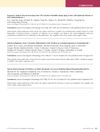 70 citations,
February 2015 in “Expert Opinion on Drug Discovery”
70 citations,
February 2015 in “Expert Opinion on Drug Discovery” Topical drugs and near-infrared light therapy show potential for treating alopecia.
 39 citations,
October 2018 in “Lupus Science & Medicine”
39 citations,
October 2018 in “Lupus Science & Medicine” Different types of hair loss in lupus need careful diagnosis for proper treatment.
[object Object]  27 citations,
December 2005 in “Journal of Cosmetic Dermatology”
27 citations,
December 2005 in “Journal of Cosmetic Dermatology” Niacin derivatives may increase hair fullness in women with hair loss.
 10 citations,
July 2018 in “Our Dermatology Online”
10 citations,
July 2018 in “Our Dermatology Online” Some vitamins and minerals are important for preventing hair loss, but treating hair loss with them without a known deficiency is not proven effective.

New treatments for hair loss should target eight main causes and use specific plant compounds and peptides for better results.
 May 2023 in “Journal of Clinical Medicine”
May 2023 in “Journal of Clinical Medicine” New understanding and treatments for hair loss are improving, but more research is needed.
September 2016 in “Springer eBooks” Gray hair is caused by oxidative stress damaging hair cells.
 113 citations,
September 2005 in “Journal of Investigative Dermatology”
113 citations,
September 2005 in “Journal of Investigative Dermatology” Applying a special compound can promote hair growth without harmful side effects.
 21 citations,
March 2006 in “Seminars in Cutaneous Medicine and Surgery”
21 citations,
March 2006 in “Seminars in Cutaneous Medicine and Surgery” Most hair loss disorders can be accurately diagnosed and treated in an outpatient setting.
 2 citations,
March 2015 in “Clinical and Experimental Dermatology”
2 citations,
March 2015 in “Clinical and Experimental Dermatology” Azathioprine can cause unusual hair loss, which may reverse after stopping the drug.
1 citations,
December 2023 in “Biomolecules” Regulating cell death in hair follicles can help prevent hair loss and promote hair growth.

Chemotherapy can cause skin issues and hair loss, and this guide explains how to manage them.
 42 citations,
March 2018 in “PLOS Biology”
42 citations,
March 2018 in “PLOS Biology” Autophagy is important for human hair growth and health.
 27 citations,
May 2016 in “Dermatologic Surgery”
27 citations,
May 2016 in “Dermatologic Surgery” Male faces age with more wrinkles and hair loss, influenced by both body changes and environmental factors.
 11 citations,
July 2017 in “Expert Opinion on Investigational Drugs”
11 citations,
July 2017 in “Expert Opinion on Investigational Drugs” New hair loss treatments may include topical medications, injections, and improved transplant methods.
 1 citations,
January 2021 in “Journal of Cancer Therapy”
1 citations,
January 2021 in “Journal of Cancer Therapy” Regenerative medicine may help reduce radiotherapy side effects like skin cancer, fibrosis, pain, and hair loss.
 1 citations,
September 2013 in “Mayo Clinic Proceedings”
1 citations,
September 2013 in “Mayo Clinic Proceedings” A woman's hair loss was treated successfully with iron supplements for her iron deficiency.
 1 citations,
September 2012 in “Journal of Investigative Dermatology”
1 citations,
September 2012 in “Journal of Investigative Dermatology” Aging reduces stem cell activation, leading to hair loss in mice lacking a specific enzyme.
 August 2023 in “The Indonesian Biomedical Journal”
August 2023 in “The Indonesian Biomedical Journal” Rosemary essential oil improved hair growth and thickness in UVB-exposed mice.
 September 2017 in “Springer eBooks”
September 2017 in “Springer eBooks” Epinephrine does not significantly affect the severity of hair loss after surgery.
 20 citations,
November 2012 in “Journal der Deutschen Dermatologischen Gesellschaft”
20 citations,
November 2012 in “Journal der Deutschen Dermatologischen Gesellschaft” Hair diseases can have psychological effects and should be treated with a combination of psychosomatic care, therapy, and medication.
 20 citations,
July 2008 in “Dermatologic Therapy”
20 citations,
July 2008 in “Dermatologic Therapy” The document says that treating the root cause of hair follicle damage is crucial to prevent permanent hair loss, and treatment options vary.
 9 citations,
June 2020 in “BMC Molecular and Cell Biology”
9 citations,
June 2020 in “BMC Molecular and Cell Biology” Stress hormone CRF can cause hair loss by affecting hair growth cells and hormones.
 2 citations,
March 2020 in “International Journal of Molecular Sciences”
2 citations,
March 2020 in “International Journal of Molecular Sciences” Topical treatments can deliver active molecules to skin stem cells, potentially helping treat skin and hair disorders, including skin cancers and hair loss.
 1 citations,
January 2013 in “Elsevier eBooks”
1 citations,
January 2013 in “Elsevier eBooks” The document reviews various hair and nail disorders, their causes, and treatments, emphasizing the need for proper diagnosis and the link between nail changes and systemic diseases.
 1 citations,
December 2011
1 citations,
December 2011 Marine-derived ingredients show potential for hair health but need more human trials to confirm effectiveness.
 98 citations,
May 2008 in “British Journal of Dermatology”
98 citations,
May 2008 in “British Journal of Dermatology” There are many treatments for permanent hair loss disorders, but their effectiveness varies and there's no clear best option.
[object Object]  57 citations,
September 2017 in “Journal of controlled release”
57 citations,
September 2017 in “Journal of controlled release” Nanocarrier-loaded gels improve drug delivery for cancer, skin conditions, and hair loss.
 53 citations,
March 2014 in “Cold Spring Harbor Perspectives in Medicine”
53 citations,
March 2014 in “Cold Spring Harbor Perspectives in Medicine” The document explains different types of hair loss, their causes, and treatments, and suggests future research areas.
 51 citations,
December 2011 in “The Journal of Dermatology”
51 citations,
December 2011 in “The Journal of Dermatology” New treatments for severe hair loss often fail, but some patients see hair regrowth with specific therapies, and treatment should be tailored to the individual's situation.




























